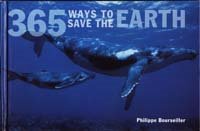Inspired Links

The Origin of 365 Ways...
I came across this amazing book by Phillippe Bourseiller when i was in Denmark close to a year ago:
"For the past 15 years, Phillippe Bourseiller has photographed nature from every angle: from the eruption of the volcano Pinatubo to the great deserts of ice and sand, he has captured the hidden colours and breathtaking lights of our planet.
But our contemporary way of life threatens this fragile beauty. To encourage more restraint, Philippe Bourseiller teams 365 photographs with a daily ecological action. Each of the initiatives is accompanied by facts and statistics that illustrate the threats to the environment posed by our behavious, and demonstrate the beneficial consequences of the recommended actions. Each day reveals the image of a wonder of nature along with the guidelines to preserve our planet. Through the pages of 365 Ways to Save the Earth, a truly ethical way of life takes shape."
Starting from today, i would like to post each inspiring page according to the days on the yearly calendar (supposed to start from jan, but...i'll catch up!). Hopefully, you'll look at everyday a little differently after this...
Blog Archive
-
▼
2007
(28)
-
▼
January
(10)
- Leisure - Be environmentally aware when taking par...
- Agriculture - Make it a rule to buy organic for a ...
- Consumption - Buy recycled
- Water - Use less water when flushing the toilet
- Waste - Encourage your place of work to start comp...
- Energy - Improve the efficiency of your radiators
- Energy - Buy 'green' electricity
- Forests - Recycle Christmas trees and cards
- Energy - Turn down your heating by 1 deg Celcius
- Agriculture - Buy Fair Trade products, and help co...
-
▼
January
(10)
Tuesday, January 9, 2007
Agriculture - Make it a rule to buy organic for a given product
To protect crops from parasitic insects and plants, farmers use pesticides, and to increase their crop yields, they spread fertilisers. World consumption of the chemicals used in both is growing exponentially: it leapt from 30 million tonnes a year in 1960 to 140 million tonnes in 2000.
However, half the pesticides and fertilisers sprayed over the fields are of no benefit to crops. As soon as it rains, the excess runs off into rivers and seeps into groundwater (from which two-thirds of our drinking water comes).
_____________________________________________________________________
Organic farming avoids the damage caused to the environment by pesticides and insecticides. Buy organic produce to encourage organic farming practices and in the interests of your own health - strawberries, apples and spinach, in particular, retain high levels of pesticide residue if produced non-organically. www.organicconsumers.org/organic/pesticide-residues.cfm
Subscribe to:
Post Comments (Atom)
About Me
- cnmmnc
- Who am i? What i say doesnt matter..What i have done? That makes me.

No comments:
Post a Comment